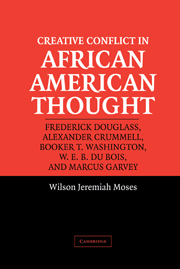Book contents
- Frontmatter
- Contents
- Acknowledgments
- Preface: Struggle, Challenge, and History
- 1 Introduction: Reality and Contradiction
- FREDERICK DOUGLASS: THE INDIVIDUALIST AS RACE MAN
- 2 Frederick Douglass: Superstar and Public Intellectual
- 3 Where Honor Is Due: Frederick Douglass as Representative Black Man
- 4 Writing Freely? Frederick Douglass and the Constraints of Racialized Writing
- ALEXANDER CRUMMELL: THE ANGLOPHILE AS AFROCENTRIST
- BOOKER TALIAFERO WASHINGTON: THE IDEALIST AS MATERIALIST
- W. E. B. DU BOIS: THE DEMOCRAT AS AUTHORITARIAN
- MARCUS MOZIAH GARVEY: THE REALIST AS ROMANTIC
- CONCLUSION: RESCUING HEROES FROM THEIR ADMIRERS
- Index
2 - Frederick Douglass: Superstar and Public Intellectual
Published online by Cambridge University Press: 07 November 2009
- Frontmatter
- Contents
- Acknowledgments
- Preface: Struggle, Challenge, and History
- 1 Introduction: Reality and Contradiction
- FREDERICK DOUGLASS: THE INDIVIDUALIST AS RACE MAN
- 2 Frederick Douglass: Superstar and Public Intellectual
- 3 Where Honor Is Due: Frederick Douglass as Representative Black Man
- 4 Writing Freely? Frederick Douglass and the Constraints of Racialized Writing
- ALEXANDER CRUMMELL: THE ANGLOPHILE AS AFROCENTRIST
- BOOKER TALIAFERO WASHINGTON: THE IDEALIST AS MATERIALIST
- W. E. B. DU BOIS: THE DEMOCRAT AS AUTHORITARIAN
- MARCUS MOZIAH GARVEY: THE REALIST AS ROMANTIC
- CONCLUSION: RESCUING HEROES FROM THEIR ADMIRERS
- Index
Summary
Stunningly handsome at sixty years of age, with his burnished silver mane, his eyes large, piercing, and commanding, yet warm and sensitive – that is the portrait of Frederick Douglass reproduced in classic sepia tones on my study wall. Most African Americans can happily identify with that sterling bearded sage. With his ideas, however, we identify more abstractly, and Douglass' enduring popularity, in my view, derives almost entirely from the enduring forcefulness of his character and the courage of his freedom struggle. I do not know if we have a definite understanding of his political vision. We view his resounding moral indictments as the last word on American slavery, but slavery cannot be discussed completely in moral terms. Morality never prevented its existence, nor was it abolished entirely for moral reasons. And Douglass' moral reasoning, unassailable though it was, did not provide answers to the problems of what to do after the destruction of slavery.
Douglass' animal magnetism and strong character – not to mention his powerful intellect and astounding physical courage – usually gave him psychological advantages in dealings with challengers. But he had a tendency to be carried away in the sweep of his own rhetoric, and brilliant though he was, Douglass did not stand head and shoulders above every other African American contemporary. Some thought his ego obnoxiously overblown, and noticed in him a penchant for making generalizations on the African American condition that were little more than solipsistic projections of his own atypical career.
- Type
- Chapter
- Information
- Creative Conflict in African American Thought , pp. 21 - 45Publisher: Cambridge University PressPrint publication year: 2004



